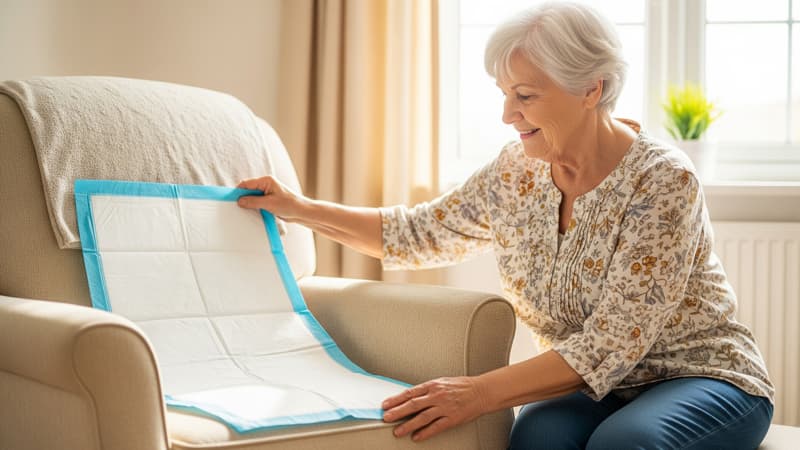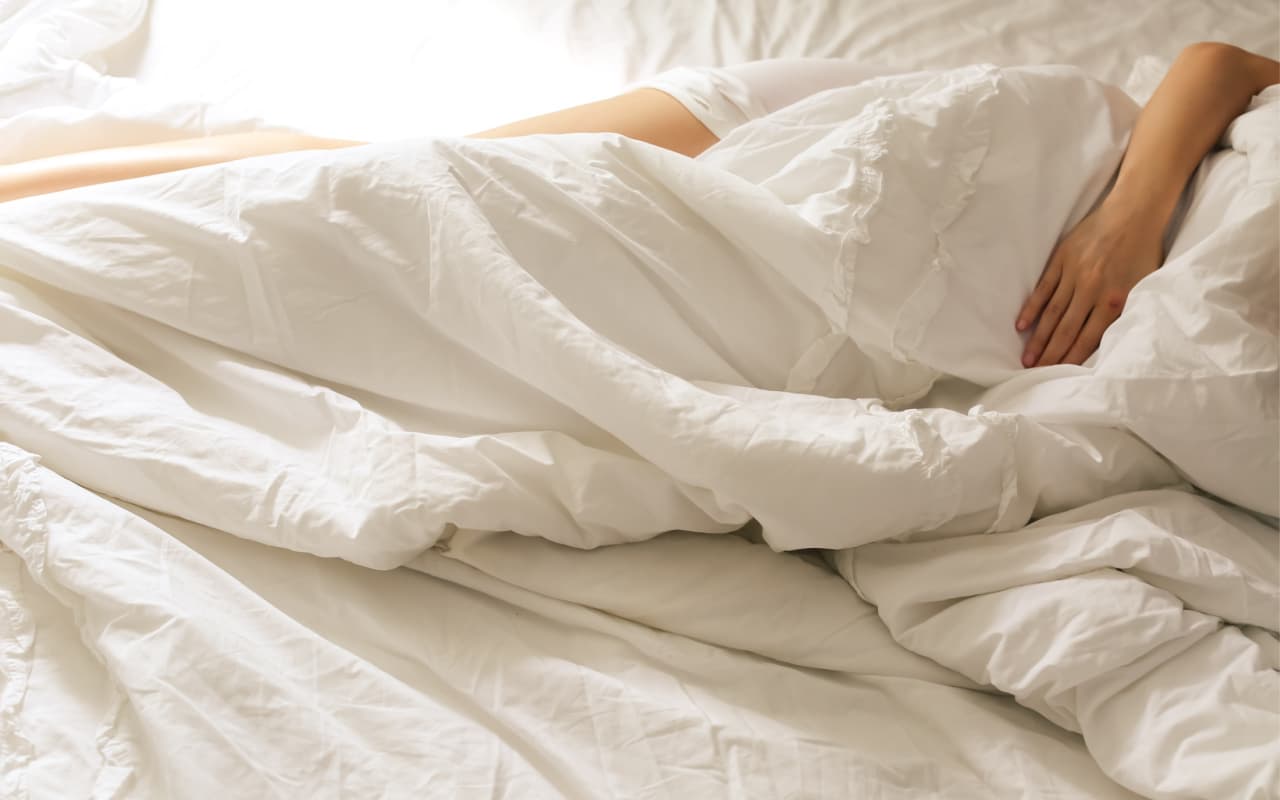Disposable vs Reusable Underpads

Written by Chad Birt on Thu Jul 22 2021.

Caring for someone who experiences urine or bowel incontinence requires extra time and energy. You want your loved one to live an independent and rewarding life, but without risking damage to furniture or having to do extra laundry. Adult diapers and booster pads can certainly help, but sometimes additional materials like underpads (or chux) are necessary. Let’s take a closer look at the differences between disposable vs reusable underpads.
What are underpads?
Underpads are large, rectangular mats designed to absorb excess liquid. They’re great for catching urine and bowel voids, but can also clean up messes caused by wound drainage, pureed foods, or enteral or parenteral feeding. There are two types of underpads –– reusable underpads and disposable underpads.
Regardless of type, all underpads feature an absorbent core and waterproof backing that prevents liquid from coming into contact with and damaging bedding or furniture. They provide protection for almost any surface, including car seats, wheelchairs, hospital beds, and church pews.
What’s the difference between disposable vs reusable underpads?
Now that you know what disposable underpads (aka chux) and reusable underpads are, let’s take a closer look at their differences:
Disposable underpads. Disposable underpads are good for a single use. They’re made of materials like vinyl or urethane and contain hundreds of polymers –– tiny beads that absorb moisture. Disposable underpads are easy to unfold and incredibly convenient. If your loved one experiences a void, simply wad the underpad up, and throw it away.
What are chux pads? Chux pads and disposable underpads are the same thing. They’re called chux, because as soon as they’re soiled you can wad them up and “chuck them” in the trash.
Reusable underpads. Reusable underpads are made of soft, cloth-like materials. They have a waterproof backing that prevents liquid from seeping through, reducing the risk of damage to clothing, bedding, or furniture. When a reusable underpad gets wet, throw it in the washing machine. Reusable underpads can be used over and over again. They’re cost-effective and environmentally friendly.
What factors should I consider when selecting disposable vs reusable underpads?
There are several factors to consider when selecting disposable vs reusable underpads, including:
The materials of the backing of the underpad is made of. The majority of underpads are made from three materials—vinyl, urethane, or spunbond.
Vinyl is most commonly found on reusable underpads, and provides a waterproof backing that locks moisture away from furniture.
PVC (Polyvinyl chloride) or polyester backings are often found on reusable underpads and tend to offer better protection against slips (the underpad is more likely to stay in place).
Clothlike backing is often found on disposable underpads and refers to a premium, more breathable backing material designed to protect skin from damage.
Plastic-like backing, or “poly-backing,” is a feature of some more economical underpad options. While poly-backing tends to be cheaper, it can also trap incontinence vapors, and if used for too long of a period, can lead to skin irritation.
In addition to these base materials, many reusable underpads feature antimicrobial and antibacterial finishes. These finishes significantly reduce the risk of skin irritation and infections.
The materials inside the core of the underpad. Often, the materials inside an underpad are different from those on the exterior. For example, many disposable underpads feature a polymer core. Polymer soaks up moisture and turns into a gel, keeping the top sheet dry and comfortable. Polymer is ideal if you’re looking for heavier absorbency.
Reusable underpads have a quilted or rayon interior. These materials are more like fabric, but less absorbent. They’re able to capture liquid before it comes into contact with your loved one’s bedding or furniture. Quilted or rayon interiors are ideal for those looking strictly for furniture protection. You can also lay a reusable underpad underneath a disposable underpad for added support!
Your loved one’s weight, health, and mobility. What do you plan on using the underpads for? Is your loved one wheelchair-bound or bedridden? Or are they relatively mobile and able to use the toilet on their own? The answers to these and other related questions can help you determine if a disposable or reusable pad makes more sense. For example, reusable underpads tend to be sturdier. That makes them ideal for individuals who require frequent repositioning.
The size of the underpad. Underpads come in a variety of sizes. The range starts at 17” x 24” (perfect for covering the seat on a standard chair) and goes all the way to 36” x 77” (the size of a twin-size mattress). To select the right size, determine what it is you plan on covering.
What are the advantages of washable incontinence pads?
Some of the advantages that washable incontinence pads provide include:
The materials are soft and cloth-like
Environmentally friendly
Cost-effective
Reduced risk of rashes and skin irritation
Hold more weight, making it easy to reposition your loved one
Can be used dozens of times
What are the advantages of disposable incontinence pads?
Some of the advantages that disposable incontinence pads provide include:
Quick and convenient clean up
Great for travel
Can be used for several days (as long as they remain clean and dry)
Improved odor control
Each package contains multiple pads
Added absorbency compared to reusable options
Where can I buy reusable or disposable chux pads?
Most grocery stores, pharmacies, and big-box retailers carry both reusable and disposable chux pads. We also carry a variety of underpads here on the Carewell website. Below, we’ve highlighted some of our best sellers:
Cardinal Wings Disposable Underpads
These disposable underpads from Cardinal are designed for heavy incontinence. They’re 30” x 36” and comfortably cover the top of a bed or chair. Each underpad is capable of absorbing more than three cups of liquid. For reference, the average adult releases one to one and a half cups of liquid whenever they “go.”
Key benefits & features:
Disposable
Made in the USA
Cloth-like backing
Urine and fecal protection
Super absorbent core that quickly locks in fluid and neutralizes unpleasant odors
Beck’s Classic Reusable Underpads, Heavy
These reusable underpads manufactured by Beck’s are made of a soft, cloth-like material. They have a vinyl backing that holds the underpad in place, making it easy to reposition your loved one if they’re bedridden. The cotton top sheet is perfect for sensitive skin, reducing the risk of rashes and irritation.
Key benefits & features:
Reusable
Machine washable
Extra threads make the underpad durable and sturdy
Environmentally friendly
Pads range in size from 34” x 36” to 36” x 72”
Attends Premier Underpads, Overnight
These overnight underpads from Attends feature a Dry-Lock absorbent polymer core with Odor Guard. When combined, these cutting-edge technologies lock in moisture, prevent leaks, and capture unpleasant odors. There are two options for purchase—a pack of 10 or a case of 60.
Key benefits & features:
Low air-flow mattress compatible and ultra-breathable
Cloth-like materials that are gentle on the skin, even for those who are wheelchair-bound or bedridden
The polymer core locks in moisture, keeping your loved one’s skin clean and dry
Can support individuals who are up to 350 pounds
McKesson Underpads, Ultra
Keep your furniture dry and clean with the McKesson Underpad, Ultra. Designed for heavy incontinence, this super absorbent, disposable underpad features a fluff/polymer core that locks in wetness and reduces the pH of urine for a fresh, clean feeling. The soft, non-woven topsheet is gentle on skin, making it perfect for wound care, while the poly-backing ensures your furniture, wheelchairs, or car seats stay completely protected.
Key benefits & features:
The fluff/polymer core not only locks in wetness but also reduces the pH of urine, ensuring a fresh and clean feeling.
Designed for heavy incontinence, these underpads effectively protect beds, chairs, wheelchairs, and car seats from moisture.
The soft, non-woven bonded topsheet is gentle on the skin, making it ideal for wound care and general comfort.
A poly backsheet prevents any moisture from leaking through, keeping your furniture completely dry.
These single-use pads are designed for easy and hygienic disposal after use.
CareFor Deluxe Reusable Underpads, Heavy
This deluxe, reusable underpad features a quilt-like design that’s both soft and incredibly absorbent. It’s filled with a combination of polyester and rayon, perfect for trapping in odors and liquid. What’s more, the polyester top sheet has an antimicrobial coating, inhibiting the growth of bacteria and fungi.
Key benefits & features:
Unique three-layer construction that prevents the fabric from balling, slipping, or shifting
Ideal for protecting bedding, chairs, and other types of furniture
Has a polyester backsheet that’s 100% waterproof
Machine washable and dryer safe
Finding the right type of underpad for your loved one may take some trial and error. If you have any questions along the way, reach out to our friendly Care Team, by calling (800) 696-CARE or sending a message to support@carewell.com.
Other Articles You May Like

Protective Bedding: Underpads vs Mattress Protectors vs Protective Sheets
It’s important to invest in protective bedding, but what’s the difference between underpads vs mattress protectors vs protective sheets?
See more about protective bedding. >
The Best Cardinal Health Products for Incontinence and Personal Care of 2025
Learn more about our favorite Cardinal Health products; one of the most trusted home care brands on the market.
Read More >
Chad Birt is a freelance medical writer who resides in Astoria, Oregon. When he isn't behind a keyboard, you can find him hiking, camping, or birdwatching with his wife Ella and their two dogs, Diane and Thoreau.